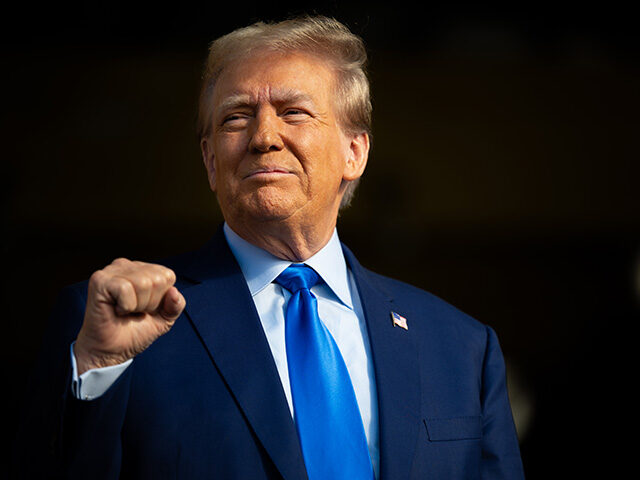Former President Donald Trump will remain on the ballot in Michigan after the Michigan Supreme Court rejected an appeal rooted in the Constitution’s “Insurrection Clause,” although on procedural grounds.
Unlike the Colorado Supreme Court’s decision, the Michigan Supreme Court ruled that Trump can remain on the ballot for the state’s upcoming primary. It upheld the unanimous ruling of Michigan’s Court of Appeals, where a three-judge panel held that the argument — that Trump “engaged in insurrection” — was not ripe (meaning that ruling on it would be premature).
However, the Michigan Supreme Court did not delve into whether or not it believed Trump engaged in insurrection as rooted in Section Three of the Fourteenth Amendment. Rather, the court rejected the attempt to appeal, lodged by an advocacy group, on procedural grounds, leaving undisturbed the decision from the Michigan Court of Appeals. The lower court determined that the question is irrelevant at this point in time in relation to Trump’s placement on the presidential primary ballot in the Wolverine State.
“At the moment, the only event about to occur is the presidential primary election. But as explained, whether Trump is disqualified is irrelevant to his placement on that particular ballot,” the appeals court determined.
Justice Elizabeth Welch of the Michigan Supreme Court wrote that the Trump challenges “have identified no analogous provision in the Michigan Election Law that requires someone seeking the office of President of the United States to attest to their legal qualification to hold the office,” ultimately affirming the Court of Appeals’ ruling, which she said “still allows appellants to renew their legal efforts as to the Michigan general election later in 2024” if Trump becomes the nominee — a very likely scenario.
In other words, the legal challenges are still not over. Regardless, the ruling contrasts with that of Colorado’s Supreme Court, which “found by clear and convincing evidence that President Trump engaged in insurrection as those terms are used in Section Three” of the Fourteenth Amendment.
“We consider and reject President Trump’s argument that his speech on January 6 was protected by the First Amendment,” the Colorado opinion reads in part, continuing:
The fact that, at one point during his speech, President Trump said that “everyone here will soon be marching to the Capitol building to peacefully and patriotically make your voices heard” does not persuade us that the district court erred in finding that the first prong of the Brandenberg test was met. See Thompson, 590 F. Supp. 3d at 113–14. This isolated reference “cannot inoculate [President 20 Thompson involved a motion to dismiss. As a result, the court determined only that President Trump’s speech “plausibly [involved] words of incitement not protected by the First Amendment.” Thompson, 590 F. Supp. 3d at 115; see Bell Atlantic Corp. v. Twombly, 550 U.S. 544, 553 (2007) (requiring plaintiffs to show that their complaints are plausible to survive a motion to dismiss for failure to state a claim). 128 Trump] against the conclusion that his exhortation, made nearly an hour later, to ‘fight like hell’ immediately before sending rally-goers to the Capitol, within the context of the larger Speech and circumstances, was not protected expression.” Id. at 117.
Colorado’s determination, however, is being challenged by Trump and his team, who remain confident that the U.S. Supreme Court will ultimately rule in their favor.
“I’m not even concerned that the Supreme Court will make the right decision here,” Trump lawyer Alina Habba told Breitbart News Daily.
“You’re not a pioneer,” she said of the left-leaning justices in Colorado. “You’re going to look ridiculous. You do not understand due process. You do not understand the Constitution. You are literally a state-level court that is going to look ridiculous, okay, when the Supreme Court — whether you’re a federal judge or a state judge — when the Supreme Court overturns you. That’s not a good look.”
The case is LaBrant v. Secretary of State, No. 166470 in the Michigan Supreme Court.

COMMENTS
Please let us know if you're having issues with commenting.